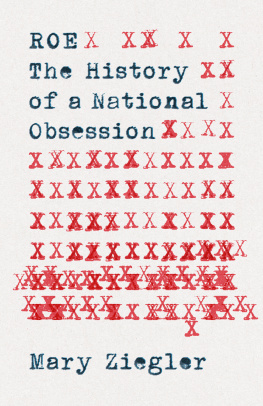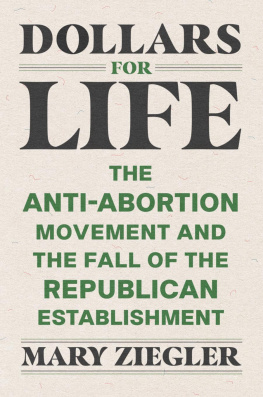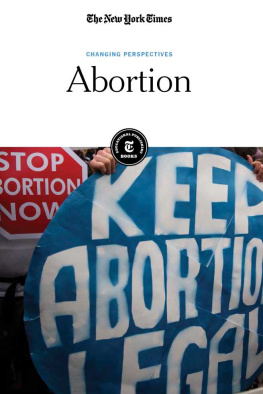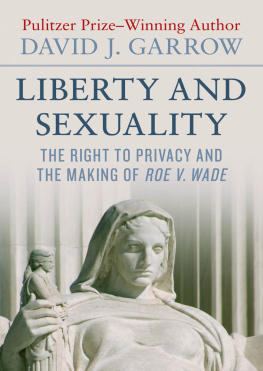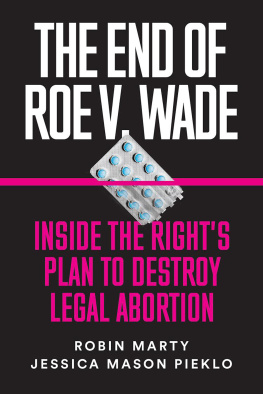Roe

Copyright 2023 by Mary Ziegler.
All rights reserved.
This book may not be reproduced, in whole or in part, including illustrations, in any form (beyond that copying permitted by Sections 107 and 108 of the U.S. Copyright Law and except by reviewers for the public press), without written permission from the publishers.
Yale University Press books may be purchased in quantity for educational, business, or promotional use. For information, please e-mail (U.K. office).
Set in Adobe Garamond and Gotham types by IDS Infotech Ltd.
Printed in the United States of America.
Library of Congress Control Number: 2022938461
ISBN 978-0-300-26610-8 (hardcover : alk. paper)
A catalogue record for this book is available from the British Library.
This paper meets the requirements of ANSI/NISO Z39.481992 (Permanence of Paper).
10 9 8 7 6 5 4 3 2 1
To Dan, forever
Contents
Preface
In the fall of 2021, when the Supreme Court heard a case that might eliminate abortion rights in the United States, Roe v. Wade again led the news cycle. The case before the justices, Dobbs v. Jackson Womens Health Organization, involved a Mississippi ban on abortion at fifteen weeks, well before Roes cutoff at viability, the point at which survival is possible outside the womb. Reporters across the world questioned why the United States was rolling back protection for abortion just as nations from Argentina and Mexico to Kenya and South Korea were liberalizing their rules. At oral argument that December, the Courts conservative majority seemed poised not only to uphold Mississippis law but also to repudiate the idea of a right to choose.
Dobbs was big news, but Roe is never out of the headlines for long. The decision overshadows Supreme Court nominations, inspires acts of political violence, and helps to decide presidential elections.
But anyone reading about U.S. constitutional law and politics is left with a nagging question: why Roe? Why, for nearly five decades, has Roe had such a magnetic pull? Scholars question its reasoning, some feminists criticize it, and most Americans are indifferent to the workings of the Supreme Court. There are other culture warsaround guns, race, and the rights of same-sex couplesin which the Court has intervened. Some major decisions, like Citizens United v. Federal Election Commission, which freed up corporations to spend more on federal elections, are both relatively well known and unpopular. Yet Roe is uniquely visible.
Many of the best-known Supreme Court decisions receive attention because Americans appear to agree on them. Scholars have identified a constitutional canona set of crucial decisions that the entire political spectrum largely agrees were correctly decidedand an anti-canon, a body of opinions that are universally derided. For example, Americans from left to right agree that the Dred Scott v. Sandford, which held that people of African descent could never be citizens, was terrible. Everyone says that Brown v. Board of Education, a decision invalidating the racial segregation of schools, should not be overruled. Canonical and anti-canonical cases are important because they offer shared reference points for disagreement about law, politics, and culture. There are some decisions that we all think are good or bad, and this allows for a more coherent dialogue even as we hotly contest the lessons these cases offer. Roes attraction is radically different: Americans disagree intensely about whether it was right or wrong.
Perhaps Roes hold on us reflects the divisiveness of abortion itself. Debates about abortion in the United States were deeply polarized well before 1973, when the Court issued its decision. Any major Court decision on abortion in the United States might have been iconic, but Roe swept away most existing laws and proclaimed a new right to choose.
But if Roes allure is about abortion alone, it is hard to explain why more recentand legally centralabortion decisions have not had the same cultural resonance. In 1992, the Court partially overruled Roe and grounded abortion rights in concerns about equality as well as the ideas about privacy articulated in 1973. Yet that decision, Planned Parenthood of Southeastern Pennsylvania v. Casey, has never been the kind of lightning rod that Roe is. Many Americans may not even recognize the name Casey.
This book suggests that Roe has remained so salient for so long because it has been used to express nuanced, complicated ideas about abortion that the Supreme Court supposedly put out of reach in 1973. Since the battle to reform abortion laws began, the discussion has often seemed binary: abortion will be legal or criminal; abortion rights are a constitutional imperative or a mockery of human rights; the American public is pro-life or pro-choice. Yet in reality, abortion in America has been defined as much by complexity as by bright lines.
Roe has become the repository for the contradictions of the American abortion war. By infusing it with so many complex ideas, those contesting the abortion wars can preserve the faade of a black-and-white debate. But by telling the story of how we have redefined Roe, I hope to illuminate the paradoxes of our abortion politics and show that the pro-choice/pro-life binary has captured only a small part of how Americans think, talk, and fight about abortion.
Of course, Americans have reinterpreted decisions beyond Roe. Jamal Greene, Sanford Levinson, Ken Kersch, Jack Balkin, and others have done important work on how politics can change the way we interpret major Supreme Court rulings. But the history considered here tells us something important about how this meaning-making happens. Roe is perhaps the best example of a highly salient judicial decision that fits in neither the canon nor the anti-canon. Like canonical cases, it takes on a range of meanings that reflect differences over national values. But its power is not that we agree on whether it was rightly decided. It captures our imaginations because it has become both a meta-symbol of our many political and cultural disagreements and a shorthand for their inherent contradictions.
Staking out a position on Roe may seem like a helpful shortcut, a quick way to distinguish political friend from foe. But when discussing Roe, many people raise questions or arguments that do not fit the left/right, Democrat/Republican, pro-choice/pro-life categories that often define discussion. On the surface, Roe appears to reflect our profound polarization, but the ways we discuss it suggest that our views are neither simple nor diametrically opposed. Americans discussing Roe raise complex questions about sexual consent, sexual violence, and sexual harassment, about the role of the judiciary in American democracy, about the needs of working parents, about the role of science in politics, about racial justice, and about religious liberty. A symbol of everything that divides us, Roe reflects the degree to which Americans do not fall into cleanly drawn categories when it comes to abortion or many of our other most divisive issues.
That this symbol of our disagreements is a Supreme Court decision carries its own contradictions. Our constitutional canonand Roe, the clearest shorthand for our political disagreementsinvolve decisions rendered by judges. Yet there is a disconnect between the unique legitimacy of judicial interpretation that such a practice assumes and the way Americans actually rethink precedent. Invoking a decision as a touchstone of debate suggests deference to the judiciary, but the free and frequent reinterpretation of opinions like
Next page
